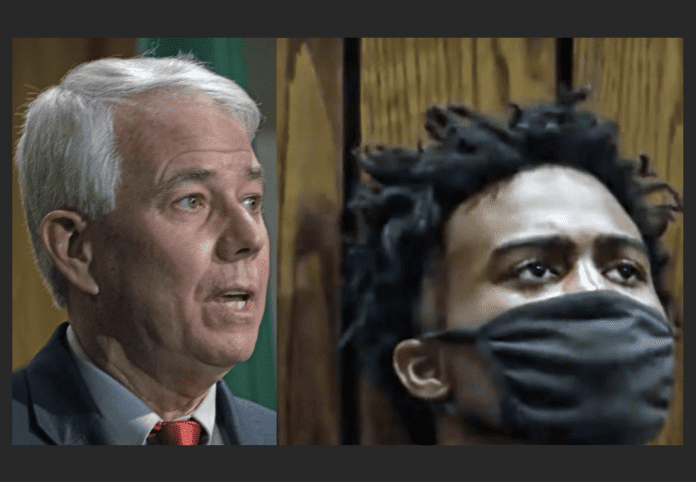If ever there was a case tailor-made for the death penalty, Ezekiel Kelly’s murder spree is it, Shelby County District Attorney General Steve Mulroy said.
In a Monday (March 27) news conference, Mulroy announced that Ezekiel Kelly will face capital punishment for an early September reign of terror last year that forced the city of Memphis into lockdown.
Mulroy has often voiced his opposition to the death penalty as a matter of personal conscience. But Kelly’s brazen Sept. 7 shooting spree, which left three dead and four critically wounded, compelled Mulroy’s first reach for the death penalty since taking office Sept. 1.
“I’ve made no secret of my opposition to capital punishment as a policy matter,” Mulroy said. “If I were a legislator, I would vote against it. But as DA, I have to enforce the law as written, even if I disagree with it.
“The facts of this case compel me to seek the maximum penalty provided under the law, regardless of my personal beliefs.”
Kelly managed to elude police for hours, shooting victims and hijacking vehicles to create citywide chaos.
Memphis police and other law enforcement agencies were left scrambling to pinpoint Kelly’s whereabouts after it was determined the multiple shootings were the work of one gunman.
Kelly even taunted police by posting live footage in real time of himself on Facebook and Instagram aiming weapons and shooting people.
Kelly’s rampage, which lasted more than five hours and extended from Memphis to Southaven. Multiple law enforcement entities joined the chase to capture Kelly, who was taken into police custody just after 9 p.m., in Whitehaven.
“If this case isn’t death-notice worthy, then no case is,” Mulroy said.
Mulroy said his conversations with victims’ families indicate that they concur and support his decision to seek the death penalty in Kelly’s case.
However, Mulroy received some pushback shortly after his news conference at the Shelby County Criminal Justice Center.
Just City Memphis, a non-profit agency is committed to criminal justice reform and offers assistance to ex-felons seeking employment, better housing, educational loans, and expungement, issued the following statement:
“Just City does not support the Shelby County District Attorney’s decision to pursue the death penalty in the matter of State of Tennessee v. Ezekiel Kelly. Seeking the death penalty means embarking on a complex, decades-long effort to take yet another life.
“Endless hearings and procedural maneuvers will delay accountability for those responsible and deny justice for victims and their families.
“The death penalty is not applied evenly across race and income level, and it should not be considered at any phase of prosecution. Death sentences are disproportionately handed down to Black people, particularly in Shelby County.
“More than half of all Tennessee death row inmates are Black, and half are from Shelby County. A growing body of evidence tells us that the death penalty does not deter crime and will not improve public safety in our community.
“Furthermore, modern application of the death penalty by lethal injection is largely experimental and often does not go as planned…The District Attorney should consider other sentences that are more humane, effective, and responsive to victims, their families, and public safety.”
Despite his own objection to capital punishment, Mulroy said notice to seek the death penalty in Kelly’s case was filed prior to the news conference because conditions surrounding the crimes dictated the action.
Under the law, Mulroy explained, any first murder-degree conviction is eligible for the death penalty, if one or more aggravating factors defined in the statute are met.
Kelly’s case meets four of those factors. Any one of them, alone, make his case death-penalty eligible.
Those factors are:
- The defendant was previously convicted of one or more felonies, other than the present charges, whose statutory elements involve the use of violence to the person.
- The defendant committed “mass murder,” which is defined as the murder of three or more persons, whether committed during a single criminal episode, or at different times within a 48-month period.
- Murder was committed in the course of an act of terrorism (see TCA 39-13-805 Commission of Act of Terrorism).
- Murder was committed at random, and the reasons for the killing are not obvious or easily understood.
Mulroy said his office has provided discovery of evidence to the defense and will continue to work cooperatively with Kelly’s defense in the interest of bringing justice in this case.
Mulroy said the case could be tried as early as six months.



